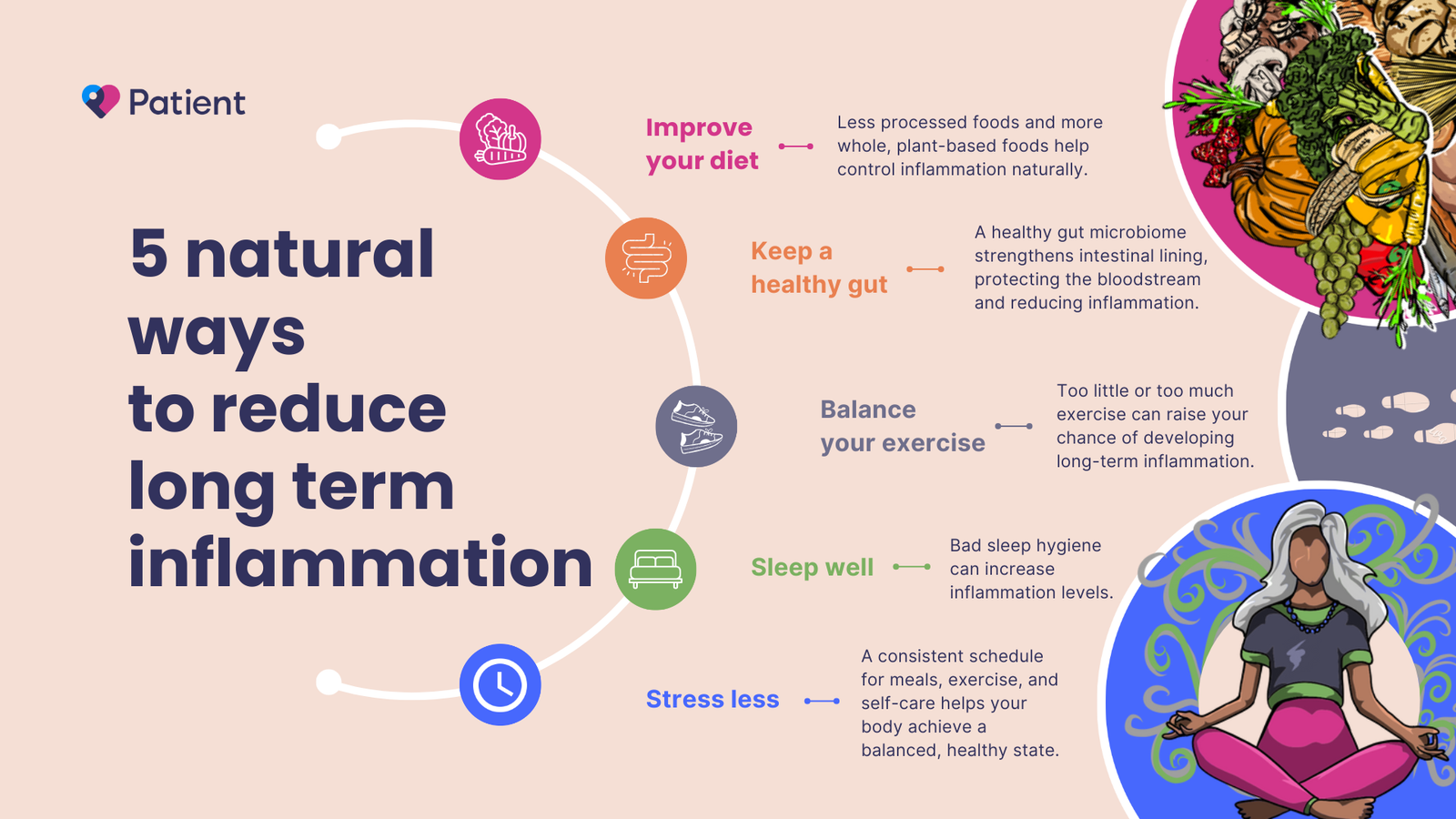
5 natural ways to reduce inflammation
Peer reviewed by Dr Krishna Vakharia, MRCGPAuthored by Victoria RawOriginally published 12 Nov 2024
Meets Patient’s editorial guidelines
- DownloadDownload
- Share
- Language
- Discussion
Inflammation is your body's way of protecting itself against injury or infection - causing swelling, redness, and heat. Short-term (acute) inflammation is vital for healing, but long-term (chronic) inflammation can lead to serious health issues. We look into the underlying causes of long-term inflammation and ways to prevent it.
In this article:
Continue reading below
What is inflammation?
Inflammation is your body's natural defence mechanism and is crucial for a healthy immune system. It helps safeguard against harmful germs (pathogens), boosts tissue repair, and clears away damaged cells.
Sebnem Unluisler, genetic engineer and Chief Longevity Officer, London Regenerative Institute says this protective response is kick-started when your immune cells recognise harmful stimuli. This triggers the release of molecules like cytokines - chemical messengers which promote blood flow - to recruit more immune cells to the affected site.
"While this response is essential for short-term healing, unresolved inflammation can lead to health issues," she says. "Long-term inflammation occurs when this immune response doesn’t turn off."
Over time, this can lead to conditions such as:
Certain cancers.
Neurodegenerative diseases.
She adds that long-term inflammation is also associated with ageing. This is because it harms your cells, and weakens your muscle function.
Symptoms of inflammation
Short-term and long-term inflammation come with different symptoms.
Short-term inflammation - pain, redness, heat, swelling, occasional loss of function depending on the body part affected.
Long-term inflammation - fatigue, digestive issues, joint pain, mental fog.
Unluisler says: "Recognising these signs early can help address potential underlying causes."
5 natural ways to reduce inflammation

Graphic: Ben Hudson
How to reduce inflammation
Back to contentsAlthough inflammation can be caused by infections, autoimmune reactions or injuries, it may also be triggered by other factors.
According to Unluisler, these can include lifestyle choices, such as poor diet, stress, lack of sleep and environmental exposures to pollution, chemicals or allergens.
"High-sugar and processed foods, sedentary lifestyles, long-term stress, and environmental toxins can all contribute to ongoing low-grade inflammation," she explains. "This can disrupt your immune function and metabolic health."
1. Improve your diet
Cut back on processed foods - especially those high in red meat and simple carbohydrate sugars - and add more whole, plant-based foods to your diet to help control inflammation naturally.
Dr Steven Shamah, gastroenterologist and metabolic health expert, New York, USA suggests following the Mediterranean diet, as it's packed with inflammation-fighting nutrients.
"This primarily plant-based eating pattern emphasises fruits, vegetables, whole grains, beans, nuts, and olive oil," he says. "It includes moderate amounts of fish, poultry, and dairy while limiting processed foods, added sugars, and saturated fats."
He adds that studies show a colourful diet, filled with natural fruits and vegetables, can help decrease gut inflammation and reduce your chance of health conditions such as heart disease, stroke, obesity, diabetes, high cholesterol, and high blood pressure.
Dr Resham Uttamchandani, a double board-certified integrative medicine physician, based in California USA recommends the following foods as helpful for lowering inflammation.
Turmeric - with curcumin as its active ingredient, turmeric is one of the most powerful anti-inflammatory agents.
Ginger - known for its digestive and warming properties, ginger can reduce inflammation, particularly in the gut.
Leafy greens - spinach, kale, and other dark greens provide essential vitamins and minerals, supporting detoxification.
Berries - blueberries, raspberries, and blackberries are high in antioxidants that neutralise free radicals contributing to inflammation.
Healthy fats - Omega-3-rich foods like flaxseeds, chia seeds, and walnuts offer essential fatty acids to counter inflammation.
Amla (Indian gooseberry) - this fruit is high in vitamin C, known for reducing oxidative stress and supporting immunity.
Curcumin with black pepper - this is a highly potent anti-inflammatory, that helps achieve therapeutic effects.
Omega-3 fatty acids - flaxseed oil, or fish oil, offer anti-inflammatory benefits, especially for heart and joint health.
"Staying hydrated with water infused with mint, cucumber, or lemon also helps detoxify your body," she adds.
2. Keep a healthy gut
Having a healthy gut microbiome strengthens your intestinal lining. This prevents harmful substances from leaking out into your bloodstream and causing inflammation.
Shamah says: "The gut is a crucial organ, connected to your brain, heart, and lungs. It’s the gateway for nutrition and a significant defence against toxins. Your diet plays a huge role in maintaining gut health."
He recommends incorporating probiotics - fermented foods filled with good bacteria - into your diet to help restore your gut microbiome.
Natural sources of probiotics include:
Sauerkraut.
"Look for products that have been well-researched, like Lactobacillus acidophilus, Lactobacillus rhamnosus GG, Saccharomyces boulardii, and Bifidobacterium longum," he advises. "If a product doesn’t have high amounts of these strains, it’s probably best to skip it."
3. Balance your exercise
A lack of exercise can raise your chance of developing long-term inflammation. This also applies to people who exercise too much.
Thomas Olsen, Director and Physiotherapist, EmbdyHealth, Greater Sydney, Australia recommends finding a happy medium between these two extremes. He suggests engaging in low-impact yoga, Pilates, or aerobics, which have been shown to help reduce inflammation.
"This will increase the activity of your immune system which, in turn, reduces inflammation," he says.
Another way these types of exercise can lower systemic inflammation is by minimising body fat.
Olsen explains: "The fat supplies we carry contain inflammation-promoting substances. Therefore, if you have excess body fat, you have an increased likelihood of developing chronic inflammation."
Uttamchandani adds that regular movement helps with natural detoxification and hormonal balance - both essential for reducing inflammation.
She says: "Exercise activates the lymphatic system, aiding in toxin removal, and balances cortisol and insulin levels, which directly influences inflammation."
4. Sleep well
Not getting enough sleep can negatively impact your health in various ways. One side effect of bad sleep hygiene is that it can increase inflammation levels in your body.
Olsen says that sleep problems and long-term pain are two things that often go hand in hand.
"People who have sleep problems are more likely to develop long-term pain, and vice versa," he explains. "However, improving your sleep quality, by falling asleep faster, sleeping for longer periods, and getting consistent restful sleep can help reduce systemic inflammation - along with long-term pain."
5. Stress less
Having a consistent schedule with set times for meals, exercise, and self-care helps your body achieve a balanced, healthy state.
Uttamchandani recommends mindful practices, meditation and breathwork - such as pranayama.
She says: "These practices help lower cortisol, reduce blood pressure, and activate the parasympathetic nervous system (PNS), bringing about calm and reducing inflammation."
Shamah explains that stress can harm gut health, and poor gut health can increase stress levels. He advises managing stress through relaxation techniques to support a healthier gut microbiome and reduce inflammation.
Olsen explains that the best relaxation techniques are the ones that you enjoy and will stick to.
"For example, meditation before bed is a great way to relax," he says. "This can also help you get better sleep."
Unluisler concludes by saying that if you have long-term health conditions - or are taking medicine - you should always talk to a healthcare professional before making any big changes to your diet or lifestyle. If your symptoms persist or worsen, speak to your doctor to rule out other underlying conditions.
5 natural ways to reduce long term inflammation
Patient picks for Preventing disease

General health and lifestyle
Are you washing your hands properly?
Most of us know how important it is to practise good hand hygiene. But just because you're washing your hands often, doesn't mean that you're washing them well. We find out the best way to wash your hands and we explain why it's so crucial to our health.
by Milly Evans

General health and lifestyle
8 common health symptoms you should never ignore
Listening to your body means more than reacting to obvious signs of illness. You should also pay attention to subtle signals that often go unnoticed. If ignored or left untreated, these quieter signs may worsen over time and jeopardise your health. On the other hand, they could be harmless - so staying tuned in to your body is important for both your health and peace of mind.
by Victoria Raw
Continue reading below
Article history
The information on this page is peer reviewed by qualified clinicians.
Next review due: 12 Nov 2017
12 Nov 2024 | Originally published
Authored by:
Victoria RawPeer reviewed by
Dr Krishna Vakharia, MRCGP

Ask, share, connect.
Browse discussions, ask questions, and share experiences across hundreds of health topics.

Feeling unwell?
Assess your symptoms online for free
Sign up to the Patient newsletter
Your weekly dose of clear, trustworthy health advice - written to help you feel informed, confident and in control.
By subscribing you accept our Privacy Policy. You can unsubscribe at any time. We never sell your data.